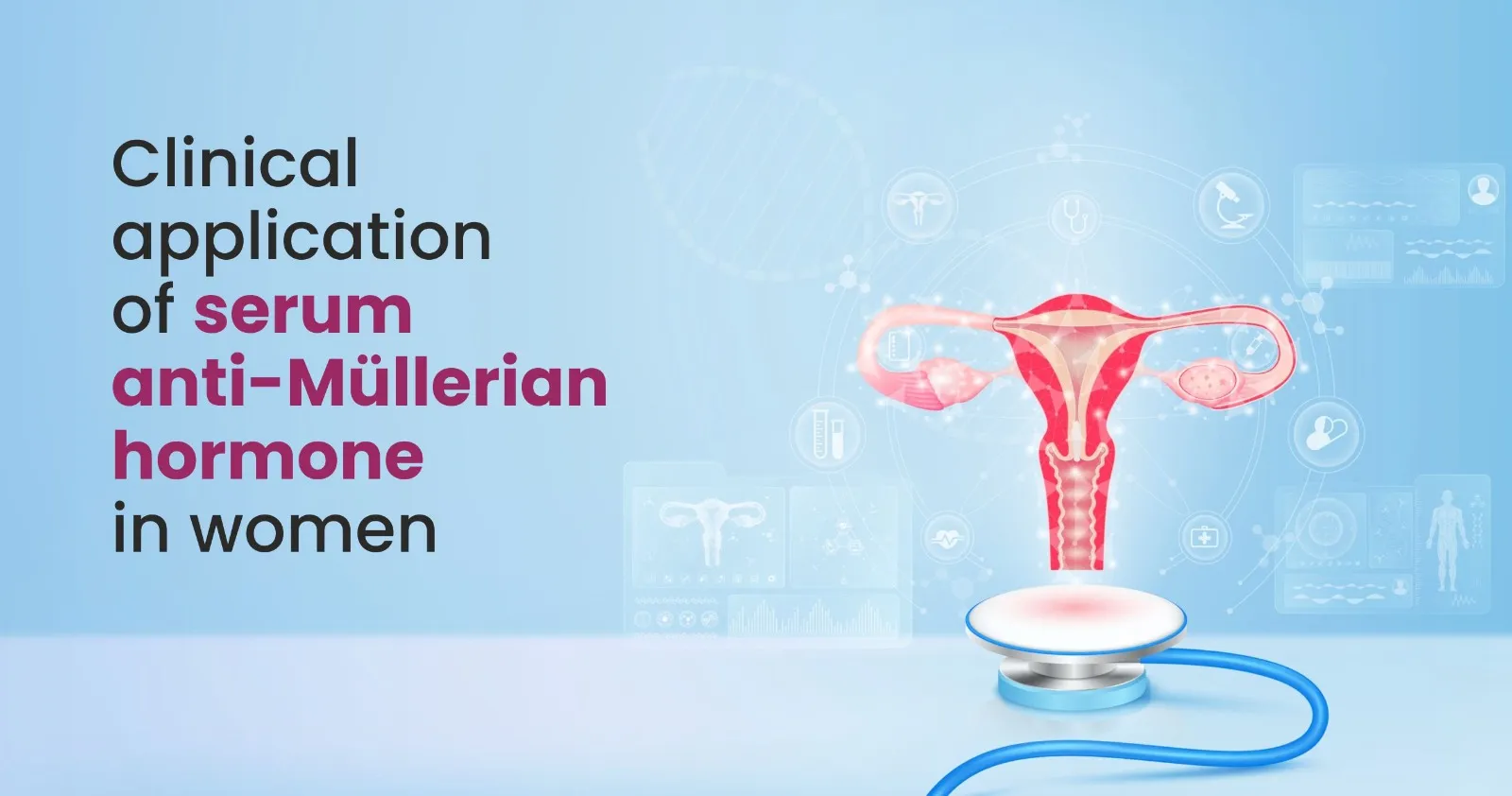Clinical Application Of Serum Anti-Müllerian Hormone In Women
Oct 04, 2023

Anti-müllerian hormone (AMH) in women is produced by the ovaries, and the level of the hormone describes the ability of a woman's ovary to produce eggs that can be fertilized for pregnancy. Testing your serum anti-müllerian hormone along with other markers will help you piece together the picture of your pregnancy.
Simply put, AMH is the best indicator to confirm your chances of getting pregnant or predict the reason for being unable to. But does it mark the end of their clinical applications? Well, not exactly!
Read on to explore the clinical applications of serum anti-müllerian hormone in women!
An Overview of AMH
Anti-müllerian Hormone (AMH) is a 140 kD glycoprotein secreted by the follicles in a woman's ovaries. The follicles are known as the fluid-filled cysts that have immature eggs. Women are generally born with a limited number of follicles, which mature during each menstrual cycle. The maturation will release an egg, where the process is known as ovulation.
The more follicles a woman has, the higher will be her AMH level, which can be tested using a blood sample. The level of AMH will be high during a woman's early twenties and will gradually decrease and become unpredictable after menopause.
Causes of Low AMH Levels
If a woman has low AMH levels, it indicates that the ovaries are producing fewer preantral follicles. There can be various reasons for a low AMH level, and here are some possible causes.
- Age – Your age is the major cause of reduced serum anti-müllerian hormone As women age, the AMH levels in their ovaries reserves will steadily decline.
- Genetic profile – DNA is another primary reason behind the decreased AMH The genetic factor might cause the quicker depletion of eggs at a rapid rate when compared with other women of the same age.
- Medical conditions – If you have a pre-medical history with special conditions like endometriosis might lower the level of AMH. Women diagnosed with autoimmune conditions such as autoimmune thyroid diseases also factor in the lower ovarian reserve.
- Surgery – Women undergoing surgical procedures for ovarian cysts or endometriosis can also suffer from reduced AMH levels.
Clinical applications of Serum Anti-Müllerian Hormone
In recent years, several studies have evaluated and emphasized the anti-müllerian hormone as a potential clinical marker of ovarian reserve. Here, we have elucidated the significance of serum AMH in the clinical field.
- A Prediction market for ovarian response
Serum AMH levels can predict both qualitative and quantitative aspects of controlled ovarian stimulation. When women undergo IVF treatment, they yield many oocytes, a cell in the ovary that undergoes meiotic division to form an ovum. An excessive response than expected will lead to lower changes in pregnancy and poor quality of embryos. In such circumstances, using the diagnostic power of serum anti-müllerian hormone will aid in predicting excessive ovarian response.
Determining the age at menopause might help women prepare for their postmenopausal and delayed reproductive life. However, there is no definite marketer to predict the age of menopause accurately. However, testing the serum AMH levels will reflect women's gradual decline in reproductive ability as they age. Therefore, the clinical application of AMH is emphasized in its role as a potential marker for menopause.
Factors Affecting Serum AMH Levels
The AMH test represents the ovarian reserve but does not depend on the menstrual cycle. Hence, it can be affected by various environmental and genetic factors, which might cause interpretation errors in the clinical application of the hormone. Here are some of the most common factors for variations associated with serum anti-müllerian hormone.
- PCOS
PCOS (Polycystic ovary syndrome) is a common ovulatory disorder. The serum AMH level will be higher in women with PCOS when compared to other women. It is due to the increase in granulosa cells, which will correlate to the severity of menstrual disturbances.
- Chemotherapy
A woman, when diagnosed with cancer, tends to undergo chemotherapy. However, the treatment is also detrimental to their fertility health. Researchers have analyzed the risks of decreased ovarian reserve in women who have undergone chemotherapy.
- Oral contraception
Serum AMH level and the related parameters are relatively lower among women who use combined oral contraceptives (COC). Experts found a considerable decrease in the small antral follicles with age, which resembles in women using COC.
- Obesity
Obesity, in general, is known for its adverse effects on reproduction and overall health. Women who are obese tend to struggle with ovulatory dysfunction, infertility, miscarriage, and other complications.
- Vitamin D deficiency
Vitamin D is a steroid hormone acting as a nuclear gene transcription factor. It also plays a key role in female-responsive systems. Experts observe that women with insufficient or deficient vitamin D show a repressive effect on serum AMH levels and follicular maturation.
When to Visit A Doctor?
An anti-müllerian hormone (AMH) test measures the amount of AMH in a blood sample, and your doctor might recommend getting an AMH test if:
- If you are having an infertility issue.
- Displaying symptoms of PCOS (polycystic ovary syndrome).
- To ensure your treatment for ovarian cancer is working effectively.
Wrapping Up!
Anti-müllerian hormone has been recognized as the reliable marker for ovarian reserve in every woman. Regarding assisted reproductive technology, the hormone has been efficiently used to predict the ovarian response to stimulation. The use of AMH as a marketer has been extended for its clinical applications, including diagnosing polycystic ovary syndrome, assessing ovarian functions, and more.
At Apollo Diagnostics, we are committed to providing world-class diagnostic services for patients across the globe. With the unique combination of inductive care, clinical excellence, and state-of-the-art technology, we have been serving as the ideal healthcare designation for good health. Book your appointment with us today!
Frequently Asked Questions (FAQs)
Q1. What is the role of anti-müllerian hormones in women?
AMH regulates the number of growing follicles and their specific selection for ovulation in women. It also serves as the negative regulator for the initial stages of follicular development. The hormone also inhibits the growth of follicles by preventing growth factors and the effect of gonadotropins.
Q2. How does AMH aid in clinical application among women?
The anti-müllerian hormone is considered an effective aid by health professionals to assess the fertility rate and predict the ageing of ovaries in women. In addition, it is also used to predict ovarian respect and guide recombinant FSH (follicle-stimulating hormone) during the ovarian stimulation process.
Q3. Is a high AMH level good for getting pregnant?
A woman with a high AMH level will have a higher chance of achieving a successful pregnancy than an individual with low levels. The normal range of AMH is between 2.2 and 3.9 ng/ml in women between 25-30 age group.
Related Blog Post
- Prevention is better than cure – Importance of regular master check
- IMPORTANCE OF REGULAR MEDICAL CHECKUPS
- Full Body Checkup – Advantages For Healthy Living
- Going for a Health Check - Points to be noted
- How Often Should You Go for a Health Check?
- Understanding Kidney Function: How KFT Tests Help Assess Renal Health
Blog Categories
- Child Health
- Mens Health
- Women's Health
- Mental Health
- Health Myths & Facts
- Fitness
- Nutrition/Recipes
- Remedies
- Weight Management
- Stress Management
- Health Supplements
- Addiction Management
- Disease Management
- Allergy
- Anemia
- Arthritis
- Asthma
- Autoimmune Diseases
- Blood Pressure
- Cancer
- Deficiencies
- Dengue/Malaria/Chikungunya
- Diabetes
- Eye Problems
- Heart Diseases
- Hepatitis
- HIV/AIDS/STD
- Hormonal Imbalance
- Infection/Flu/Viral
- Kidney
- Liver
- Menstrual Problems
- Pregnancy
- Skin & Hair Problems
- Stomach Ailments
- Thyroid
- Others
- Health Checkups
- Diagnostics/Pathology
- Lifestyle & Wellness
- Covid
- Medical Tests
- Cholesterol
- Health Tips
- Parent Care/Old Age
- Lungs
- Food Intolerance









